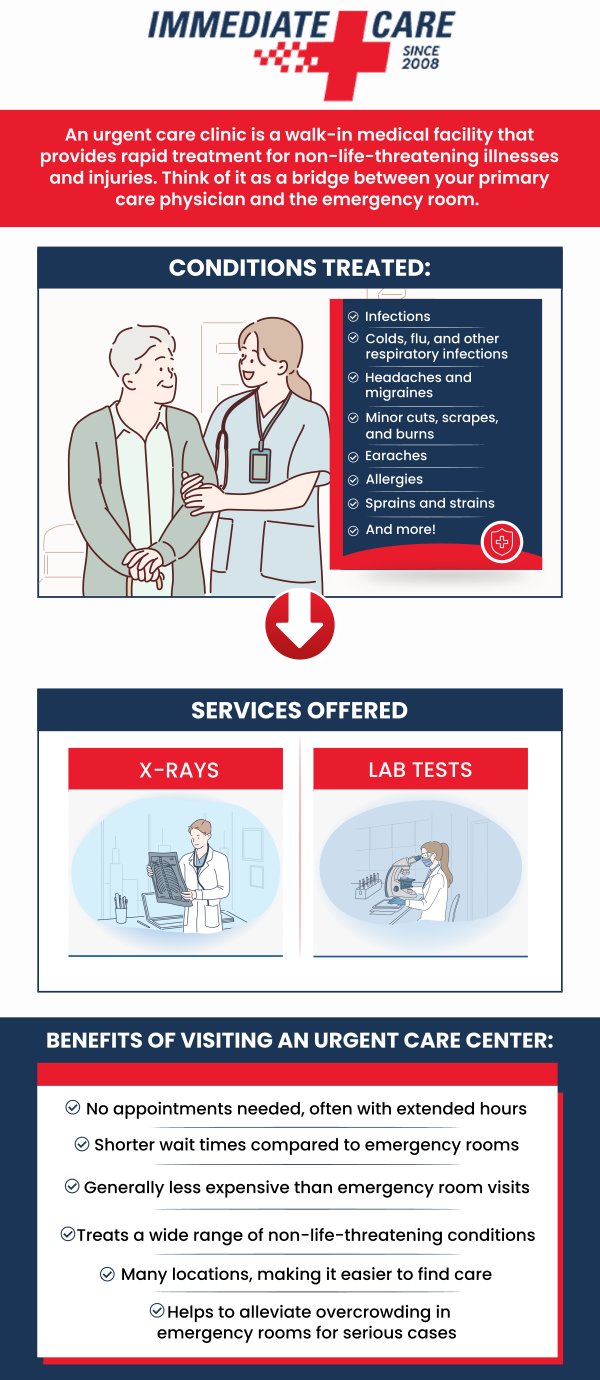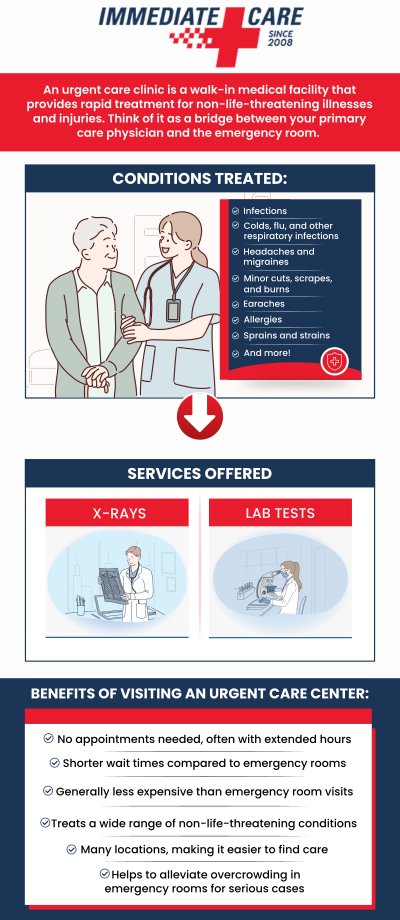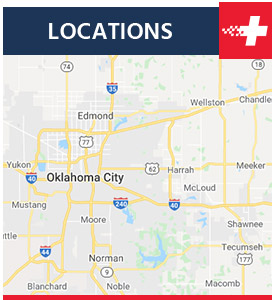When should you go to an Urgent Care vs ER?
At Immediate Care of Oklahoma, we are happy to see you for any medical concerns that are nonlife threatening. For more information, call us now. We have 7 convenient locations to serve you in Oklahoma City, OK.




Table of Contents:
When is the best time to go to an urgent care?
When should you not go to the emergency room?
What’s the difference between urgent care and emergency care?
What are common reasons to go to an emergency room?
Both urgent care clinics and emergency rooms provide essential medical services. With that being said, it may not always be clear when you should visit an urgent care clinic or an emergency room when you require same-day medical attention.
In general, the best time to go to an urgent care clinic is if you require same-day medical attention for a medical concern that is not life-threatening, and either are unable to see your primary care doctor or do not have a primary care doctor. Besides life-threatening medical emergencies, urgent care clinics can provide a broad range of services and treatments. At Immediate Care of Oklahoma, we offer the following treatments and services:
• Abdominal pain
• Allergic reactions
• Asthma, bronchitis, pneumonia, and other respiratory illnesses
• Back pain
• Burns, cuts, and lacerations
• Cold and flu treatment
• Department of Transportation (DOT) physical exams
• Diarrhea, nausea, and vomiting
• Dislocations, fractures, sprains, and strains
• Drug testing
• Ear, throat, and sinus infections
• Employment physicals
• Eye infections
• Flu shots and immunizations
• Mononucleosis treatment
• Motor vehicle accident injuries
• Occupational medicine
• On-site laboratory and X-ray services
• Pink eye (conjunctivitis) treatment
• Rashes and skin infections
• School and sports physicals
• Strep throat treatment
• Suture removal
• Tick bites and other insect bites and stings
• Tuberculosis (TB) testing
• Walk-in electrocardiogram (EKG)
• Wellness shots
• Worker’s compensation injury management and treatment
While you can technically go to the emergency room for any medical concern, it is not always the best choice. As such, if you are dealing with a medical concern that is not life-threatening and an urgent care clinic is open, or you are able to see your primary care doctor in a short enough amount of time, you should avoid the emergency room and go to an urgent care clinic or see your primary care doctor.
Since emergency rooms prioritize patients based on the severity of their medical concern, with life-threatening medical emergencies at the top of that list, they tend to have long wait times for patients that are experiencing medical concerns that are not life-threatening or do not require immediate treatment. Moreover, the services provided in an emergency room are typically more expensive than urgent care or primary care clinics.
The main difference between urgent care and emergency care is that emergency care is able to provide treatment for life-threatening medical emergencies, while urgent care is not sufficiently equipped to provide treatment for such emergencies. While both urgent care clinics and emergency rooms conduct patient evaluations for patients when they arrive for medical attention, urgent care clinics are able to function on a first-come, first-served basis more frequently than emergency rooms because they do not treat life-threatening emergencies. As a result, urgent care clinics typically have shorter wait times than emergency rooms before a patient is able to see a medical provider.
The main reason to go to the emergency room is if you are experiencing a life-threatening medical emergency. Another reason to go to the emergency room is if you require immediate medical care and there are no urgent care clinics open in your area when you need treatment. Some signs and symptoms that you should go to the emergency room for treatment include the following:
• Choking
• Compound fracture, or broken bone that pierces through the skin
• Difficulty breathing or stopped breathing
• Head injury that causes confusion, fainting, or passing out
• Heavy bleeding
• High fever with a severe headache and neck stiffness
• Injury to the neck or spine, especially if it causes inability to move or a loss of feeling
• Seizure that lasts between three to five minutes
• Severe burn
• Severe chest pain or tightness
• Sudden and unexplained pain in the arm or jaw
• Sudden inability to see, speak, move, or walk
• Suddenly weak or drooping on one side of the body
• Overdose
For urgent care services, we welcome you to come to Immediate Care of Oklahoma! Please feel free to schedule an appointment through our website, by calling us, or by visiting one of our seven clinics in Edmond, Norman, Yukon, and Oklahoma City, OK, for a walk-in appointment. We serve patients from West Moore OK, Norman (HealthPlex) OK, Norman (24th) OK, Edmond OK, Yukon OK, I-240 & Sooner RD OK, Tecumseh OK, and Bethany OK.


Additional Services You May Need
▸ Urgent Care Services
▸ Illness + Injuries
▸ On Site Lab + X-Ray
▸ Helpful Health
▸ Motor Vehicle Accidents
▸ Drug Testing
▸ MRO
▸ UTI Treatment
▸ Employment Physicals
▸ Workers Comp
▸ Strep Throat Treatment
▸ Pregnancy Testing
▸ Blood Pressure Testing
▸ Urinalysis
▸ Mononucleosis Treatment
▸ Suture Removal
▸ Respiratory Syncytial Virus
▸ OccMed








